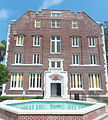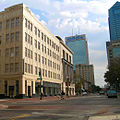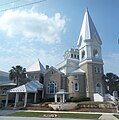User:Mathew105601/Arlington

The architecture of Jacksonville is notably marked by the city's early predominant position as Florida's financial and insurance center. Numerous buildings in the city have held state height records, dating as far back as 1902,[1] and last holding the record from 1974 to 1981.[2] It is important to note that few structures in the city center predate the Great Fire of 1901.[3]
Contributing heavily during the reconstruction period following the Great Fire of 1901, a young New York architect named Henry John Klutho would come to influence generations of local designers. Klutho's works exhibit elements influenced by both the Chicago School, championed by Louis Sullivan, and the Prairie School of architecture, popularized by Frank Lloyd Wright. As a result, Jacksonville has one of the largest collections of Prairie Style buildings outside the Midwest.[4]
By the 1950s, modernist design principles would permeate throughout the United States, transforming the rapidly growing State of Florida.[5] During this period, local architects Robert C. Broward, Taylor Hardwick, and William Morgan adapted a range design principles, including International style, Brutalism, Futurism and Organicism, all applied with an American interpretation generally referred to today as Mid-century modern design.[6] The architecture firms of Reynolds, Smith & Hills (RS&H)[7] and Kemp, Bunch & Jackson (KBJ) have also contributed a number of important works to the city's modern architectural movement. In particular, KBJ has designed more buildings in the contemporary skyline of Jacksonville than any other architectural firm. Of the 30 tallest buildings in the city, 17 are associated with KBJ.[8] With the notable exception of works by Robert A.M. Stern Architects, Welton Becket, Paul Rudolph, and Helmut Jahn, many of Jacksonville's modern landmarks were designed locally.
Residential architecture
[edit]Houses
[edit]- 1797 Kingsley Plantation
- 1854 Red Bank Plantation House, Georgian Revival
- 1876 Marabanong Mansion, Queen Anne
- 1878 Napoleon Bonaparte Broward House, Victorian
- 1886 Merrill House, Victorian/Eastlake
- 1902 Thomas V. Porter House, Classical Revival/Colonial Revival, Henry John Klutho
- 1927 Epping Forest, Spanish Colonial Revival, Marsh & Saxelbye
- 1961 Milam House, Brutalist/Mid-century modern, Paul Rudolph
-
Home in Riverside and Avondale.
-
Prairie style home in Riverside and Avondale.
-
Classical Revival residence in Ortega.
-
Shotgun houses on Cleveland Avenue in Durkeeville, Mid-Westside.
-
19th century Napoleon Bonaparte Broward House on Fort George Island.
-
Red Bank Plantation House, Georgian style.
-
Milam Residence
Apartment and condominiums
[edit]- 1925 The Carling, Renaissance Revival, Thompson, Holmes & Converse
- 1926 11 East Forsyth, Chicago school/Art Deco, Pringle & Smith (originally the Lynch Building)
-
Churchwell Building on East Bay Street
-
Klutho Apartments in Springfield.
Commercial architecture
[edit]Central Business District
[edit]- 1889 El Modelo Block
- 1902 Old Florida National Bank, Classical Revival, Edward H. Glidden (originally the Mercantile Exchange Bank Building)
- 1902 Dyal-Upchurch Building, Chicago school, Henry John Klutho
- 1908 Bisbee Building, Chicago school/Prairie school, Henry John Klutho
- 1909 YMCA Building, Chicago school/Prairie school, Henry John Klutho
- 1909 121 Atlantic Place, Chicago school/Classical Revival, Mowbray and Uffinger (originally the Atlantic National Bank Building)
- 1910 Morocco Temple, Egyptian Revival/Prairie school, Henry John Klutho
- 1911 Florida Life Building, Chicago school/Prairie school, Henry John Klutho
- 1912 Masonic Temple, Chicago school/Prairie school, Mark and Sheftall
- 1925 Groover-Stewart Drug Company Building, Marsh & Saxelbye
- 1926 Scottish Rite Masonic Center, Egyptian Revival/Art Deco, Roy A. Benjamin
- 1926 Schultz Building, Chicago school/Classical Revival, Marsh & Saxelbye
- 1926 Barnett National Bank Building, Chicago school, Mowbray and Uffinger
- 1926 Elks Club Building, Mediterranean Revival, Roy A. Benjamin
- 1928 Greenleaf & Crosby Building, Chicago school/Renaissance Revival, Marsh & Saxelbye
- 1929 Title & Trust Company of Florida Building, Classical Revival, Marsh & Saxelbye
- 1941 First Federal Savings and Loan Building, Art Deco
- 1951 Jacksonville Transportation Authority Headquarters, Art Deco (originally the Atlantic National Bank Annex)
- 1953 Old Peninsular Life Insurance Building, International style, Kemp, Bunch & Jackson (occupied by Fidelity National Financial)
- 1955 Eight Forty One, International Style, Kemp, Bunch & Jackson (originally the Prudential Building)
- 1955 Old Independent Life Building, International Style, Kemp, Bunch & Jackson
- 1957 Midtown Centre, International Style/Mid-century modern, Ira M. Koger (originally the Koger Center)
- 1958 Skinner Dairy, Mid-century modern, Taylor Hardwick
- 1960 CSX Transportation Building, International Style/Mid-century modern, Kemp, Bunch & Jackson (originally the Atlantic Coast Line Railroad Building)
- 1963 JEA Tower, Mid-century modern, Ketchum & Sharp (originally the Universal-Marion Building)
- 1965 Jessie Ball duPont Center, Mid-century modern, Taylor Hardwick
- 1967 Riverplace Tower, International Style/Mid-century modern, Welton Becket, in association with Kemp, Bunch & Jackson (originally the Gulf Life Building)
- 1967 Times-Union Building, International Style/Mid-century modern, Kemp, Bunch & Jackson
- 1971 Blue Cross Blue Shield Building, Brutalist,
- 1974 Wells Fargo Center, Modernist, Kemp, Bunch & Jackson (originally the Independent Life Building)
- 1974 BB&T Building, Modernist, Kemp, Bunch & Jackson (originally the Atlantic National Bank Building)
- 1982 Chart House, Organic/Modernist , Kendrick Bangs Kellogg
- 1983 EverBank Center, Modernist, Kemp, Bunch & Jackson (originally the Southern Bell Tower)
- 1985 Two Prudential Plaza, Modernist, Kemp, Bunch & Jackson
- 1985 Stein Mart Building, Modernist, Kemp, Bunch & Jackson
- 1986 One Enterprise Center, Postmodern, Clark Tribble Harris & Li Architects (originally the Florida National Bank Building)
- 1986 Baptist Medical Pavilion, Brutalist,
- 1987 Jacksonville Landing, Postmodern. Ben Thompson
- 1989 SunTrust Tower, Postmodern, Kemp, Bunch & Jackson (originally the American Heritage Life Building)
- 1990 Bank of America Tower, Postmodern, Helmut Jahn (originally the Barnett Center)
- 2003 Raymond James Building, Postmodern, Jess Walker of Morris Adjmi Architects
- 2008 EverBank Plaza, Postmodern
-
Hogan Street at Independent Drive
-
The Florida Times-Union Building
Hotels
[edit]- 1869 St. James Hotel (destroyed in 1901)
- 1875 Windsor Hotel (destroyed in 1901)
- 1908 Seminole Hotel, Chicago school/Prairie school, Henry John Klutho (demolished in 1974)
- 1926 Hotel George Washington, Renaissance Revival, Marsh & Saxelbye (demolished in 1973)
- 1928 Ribault Inn Club, Colonial Revival, Maurice Fatio and Mellen Clark Greeley
- 1959 Hotel Robert Meyer, Mid-century modern (demolished in 1998)[9]
- 1975 Hyatt Annex, Brutalist/Modernist, William Morgan (originally the Davis State Building)
Shopping centers
[edit]Institutional architecture
[edit]Government
[edit]- 1886 County Courthouse (destroyed in 1901)
- 1902 County Courthouse, Classical Revival, Rutledge Holmes
- 1912 St. James Building, Chicago school/Prairie school, Henry John Klutho
- 1913 The Criminal Court Building, Prairie school, Henry John Klutho (demolished in 1968)
- 1924 Federal Reserve Bank of Atlanta Jacksonville Branch, Georgian Revival, Henrietta Cuttino Dozier and A. Ten Eyck Brown
- 1933 Ed Austin Building, PWA Moderne/Stripped Classicism, Marsh & Saxelbye (originally the United States Federal Courthouse)
- 1952 Fire and Rescue Headquarters Building, Art Deco/Modernist, (originally the Federal Reserve Bank of Atlanta Jacksonville Branch)
- 1958 Old Duval County Courthouse, International Style, Reynolds, Smith & Hills
- 1960 City Hall Annex, Mid-century modern, Reynolds, Smith & Hills (Former City Hall)
- 1961 Ed Ball Building, International Style (originally the Florida National Bank Building)
- 1966 Charles E. Bennett Federal Building, Brutalist/Mid-century modern, Reynolds, Smith & Hills
- 1977 Jacksonville Sheriff's Office Headquarters, Brutalist/Modernist, William Morgan
- 2002 Bryan Simpson United States Courthouse, Postmodern, Kemp, Bunch & Jackson
- 2012 Duval County Courthouse, Kemp, Bunch & Jackson
-
Ed Austin Building
-
City Hall Annex Building]]
-
The Ed Ball Building
-
United States Courthouse
Educational
[edit]- 1905 Carnegie Library, Classical Revival, Henry John Klutho
- 1916 Centennial Hall, Georgian Revival, Howells & Stokes
- 1925 Bolles School, Mediterranean Revival, Marsh & Saxelbye
- 2005 Main Library Building, Postmodern, Robert A. M. Stern
- 2009 University of North Florida Student Union, Green/Modernist, Rink Design
-
Carnegie Library
Museums
[edit]- 1921 Karpeles Manuscript Library Museum, Classical Revival, Marsh & Saxelbye (originally the First Church of Christian Scientist)
- 1931 Museum of Contemporary Art Jacksonville, Art Deco, Marsh & Saxelbye (originally the Western Union Telegraph Building)
- 1965 Jacksonville Art Museum
- 1969 Museum of Science and History, Brutalist/Mid-century modern, William Morgan (originally the Jacksonville Children's Museum)
Houses of worship
[edit]- 1887 St. Andrew's Episcopal Church, Gothic Revival, Robert Sands Schuyler
- 1906 St. John's Cathedral, Gothic Revival, Snelling and Potter
- 1910 Basilica of the Immaculate Conception, Late Gothic Revival, M. H. Hubbard
- 1967 St. Paul's by-the-Sea Episcopal Church, Mid-century modern, Blake Ellis
-
First Presbyterian Church
-
St. John the Divine Greek Orthodox Church
-
Riverside Baptist Church
-
Bethel Church
-
St. Andrews
Cultural architecture
[edit]Sports venues
[edit]- 1995 EverBank Field
- 2003 Veterans Memorial Arena, Postmodern, Populous
- 2003 Baseball Grounds of Jacksonville, Postmodern, Populous
Entertainment venues
[edit]- 1927 Florida Theatre, Mediterranean Revival, Roy A. Benjamin
- 1927 Riverside Theatre, Renaissance Revival, Roy A. Benjamin
- 1929 Ritz Theatre, Art Deco, Jefferson Davis Powell
- 1939 San Marco Theatre, Art Deco, Roy A. Benjamin
- 1960 Jacksonville Coliseum, Mid-century modern, A. Eugene Cellar and George Ryad Fisher (demolished in 2003)
- 1962 Times-Union Center for the Performing Arts, International Style/Mid-century modern, Kemp, Bunch & Jackson
- 2017 Daily's Place, Populous
-
Jacksonville Coliseum (demolished)
Transportation architecture
[edit]- 1895 Flagler Depot (partially demolished in 1918)
- 1919 Union Station, Beaux-arts, Kenneth M. Murchison and W.B.W. Howe
-
Union Terminal
-
Interior of Jacksonville International Airport
-
View of several buildings
Parks and cultural centers
[edit]- 1564 Fort Caroline
- 1852 Old City Cemetery
- 1857 Hemming Park (originally City Park)
- 1878 Old St. Luke's Hospital 314 North Palmetto
- 1899 Klutho Park (originally Springfield Park)
- 1919 Memorial Park, Olmsted Brothers and Roy A. Benjamin
- 1947 American Red Cross Volunteer Life Saving Corps Station, Art Moderne, Jefferson Davis Powell
- 1965 Friendship Fountain, Mid-century modern, Taylor Hardwick
-
Old St. Luke Hospital
Landmarks
[edit]The 10 tallest standard structures:


| Std. rank |
Name | Year |
Location (Downtown) |
Floors |
Standard height ft |
Std. hgt m |
Notes |
|---|---|---|---|---|---|---|---|
1
|
Bank of America Tower | 1990 | North Laura Street & West Bay Street | 42 | 617 | 188 | |
2
|
Wells Fargo Center | 1974 | Laura Street & Independent Drive | 37 | 535 | 163 | |
3
|
EverBank Center | 1983 | West Bay Street & Pearl Street | 32 | 447 | 136 | |
4
|
The Peninsula at St. Johns Center | 2006 | 1401 Riverplace Boulevard | 36 | 437 | 133 | |
5
|
Riverplace Tower | 1967 | Riverplace Boulevard & Flagler Avenue | 28 | 432 | 132 | |
6
|
SunTrust Tower | 1989 | Laura Street & Independent Drive | 24 | 357 | 109 | |
7
|
The Strand at St. Johns Center | 2006 | 1401 Riverplace Boulevard | 28 | 328 | 100 | |
8
|
Aetna Building | 1954 | 841 Prudential Drive | 22 | 309 | 94 | |
9
|
Two Prudential Plaza | 1985 | Museum Circle & San Marco Boulevard | 21 | 305 | 93 | |
10
|
One Enterprise Center | 1986 | Water & Hogan Streets | 21 | 299 | 91 |
Chronology of the tallest buildings in Jacksonville:
| Years tallest (Florida) | Years tallest (city) | Name | Std. hgt ft/m |
Floors |
Year completed | Notes |
|---|---|---|---|---|---|---|
| 1902-1909 | 1902–1909 | Dyal-Upchurch Building | 82 / 25 | 6 | 1902 | |
| 1909-1912 | 1909–1912 | 121 Atlantic Place | 135 / 41 | 10 | 1909 | |
| 1912-1913 | 1912–1913 | Florida Life Building | 148 / 45 | 11 | 1912 | |
| 1913-1926 | 1913–1926 | Heard National Bank Building | 180 / 55 | 15 | 1913 | |
| 1926–1954 | Barnett National Bank Building | 224 / 68 | 18 | 1926 | ||
| 1954–1967 | Aetna Building | 309 / 94 | 22 | 1955 | ||
| 1967-1972 | 1967–1974 | Riverplace Tower | 417 / 127 | 28 | 1967 | |
| 1974-1981 | 1974–1990 | Wells Fargo Center | 535 / 163 | 37 | 1974 | |
| 1990–present | Bank of America Tower | 617 / 188 | 42 | 1990 |
"Florida Architecture: 100 places, 100 years", compiled by the Florida chapter of the American Institute of Architects.[10]
Styles and schools
[edit]Jacksonville architects used many design styles and belonged to a variety of architectural schools. Below is a list of those styles and schools.
- American Four-Square
- Art Deco/Moderne
- Beaux-Arts
- Brutalism
- Chicago School (also known as Commercial Style)
- Classical Revival (also known as Neoclassical architecture)
- Colonial Revival
- Craftsman (also known as American Craftsman)
- Dutch Colonial
- Eastlake/Stick
- Egyptian Revival
- Gothic Revival
- International
- Mediterranean Revival
- Modern
- Prairie School
- Queen Anne
- Renaissance Revival (also known as Neo-Renaissance)
- Shotgun
- Spanish Revival (also known as Spanish Colonial Revival)
- Tudor Revival
See also
[edit]- List of tallest buildings in Jacksonville
- National Register of Historic Places listings in Duval County, Florida
References
[edit]- ^ Ennis Davis (March 6, 2008). "A Century of Florida's Tallest Skyscrapers". Metro Jacksonville. Retrieved April 12, 2016.
- ^ "Wells Fargo Center, Jacksonville". Emporis. Retrieved April 12, 2016.
- ^ "Distinguish Jacksonville: The Great Fire of 1901". Metro Jacksonville. January 6, 2007. Retrieved April 12, 2016.
- ^ Wayne W. Wood. "Jacksonville's Lost Treasures". Prairie School Traveler. Retrieved April 23, 2016.
- ^ Lesa Lorusso. "Identifying American Architectural Styles: Midcentury Modern". Florida Preservationist. Florida Historical Society. Retrieved April 23, 2016.
- ^ "When Does Modern Architecture Become Historic?". Jacksonville Historical Society. Retrieved April 23, 2016.
- ^ Ennis Davis (April 12, 2012). "The Premature Destruction of Downtown Jacksonville". Urban Issues. Metro Jacksonville. Retrieved April 24, 2016.
- ^ Jessie-Lynne Kerr (January 24, 2008). "Architect transformed city waterfront". The Florida Times-Union. Retrieved April 24, 2016.
- ^ Metro Jacksonville
- ^ "Florida Architecture: 100 Years. 100 Places". American Institute of Architects Florida. Retrieved May 7, 2013.
Further reading
[edit]- Wood, Wayne W., Davis, Judy (1989). Jacksonville's Architectural Heritage: Landmarks for the Future. University Press of Florida. ISBN 0-8130-0953-7
- Broward, Robert (1984). The Architecture of Henry John Klutho. University Press of Florida. ISBN 0-8130-0731-3
- Hochstim, Jan (2005). Florida Modern: Residential Architecture 1945-1970. Rizzoli. ISBN 0-8478-2603-1
- King, Joseph (2005). Paul Rudolph: The Florida Houses. Princeton Architectural Press. ISBN 1-5689-8551-7
- McCarter, Robert (2002). William Morgan, Selected and Current Works. Images Publishing Group. ISBN 1-8769-0702-9
- Taylor Hardwick (2014). Taylor Hardwick: 60 Years of Design. Taylor Hardwick. ISBN 0-6159-7671-9
External links
[edit]
























![City Hall Annex Building]]](http://upload.wikimedia.org/wikipedia/commons/thumb/4/4e/Jacksonville_City_Hall_Annex.jpg/120px-Jacksonville_City_Hall_Annex.jpg)

































